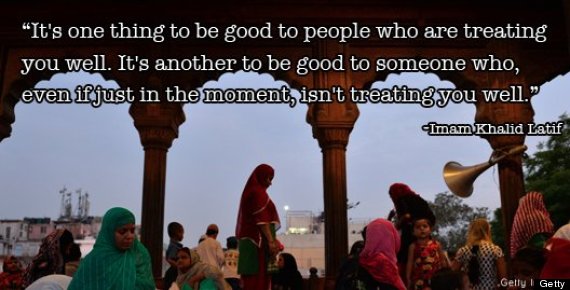Imam Khalid Latif is blogging his reflections during the month of Ramadan for the fourth year in a row, featured daily on HuffPost Religion. For a complete record of his previous posts, visit his author page, and to follow along with the rest of his reflections, sign up for an author email alert above, visit his Facebook page or follow him on Twitter.
Last night I came home late in the evening and found that my wife, Priya, had made some chimichangas, for me to eat. I really enjoy eating everything that she makes, but when she makes chimichangas it's particularly amazing, not because of how it tastes, or because she makes them fresh from scratch, but because of how she had made it for me once, and how I will never forget that.
Like most married couples, Priya and I argue. Little things, big things, and things that have nothing to do with either of us but find themselves unreconciled and easily taken out against each other instead of the actual source of conflict, all serve as a starting point for a fight. Sometimes it's easily resolved, sometimes it's prolonged. Sometimes we fight fair and sometimes we end up being really terrible to each other. The terrible arguments are the ones that are most exhausting and usually the ones that end up having us talking at each other rather than to each other. They don't happen so often, alhamdulillah, but when they do it's tough to digest.
One day we were having a pretty bad fight. The conversation started normal but soon escalated to a place neither of us wanted it to go. Our voices got louder and then soon became silent as we stopped talking to each other for some time. We went back and forth over the course of the day and into the evening, trying to restart the conversation and make amends, but each time ending up in argumentation again. By this point it didn't even seem like we were hearing other.
Speaking for myself, I was quite tired. I wasn't able to focus on anything, had started to develop a headache, and could only imagine what she was going through. We had one more conversation, the tenor of which was a little more civil. We took a breath, heard each other out and where the other was coming from and said our apologies. The day long argument was over.
I was supposed to go to a meeting that night which I had told myself I wouldn't go to because I didn't want to leave when we were in the middle of a fight. I asked her if should get some food for us for dinner to which she said, "Sorry I thought you were going to be at a meeting tonight so I haven't finished making dinner yet. I thought you would eat later when you came home, but I can finish it up really quickly now." I was a little confused and didn't really understand what she meant by finishing dinner so I asked what she was talking about. She said, "I'm making chimichangas because I know how much you like them." I started to cry and said, "You cooked dinner for me even when we were fighting?" My heart trembled from the thoughtfulness as I ran to hug her.
The Prophet Muhammad, peace and blessings be upon him, was constantly doing good for people, whether they were his supporters or not. A woman used to throw garbage upon him from her window on a regular basis and one day when the garbage didn't fall, he went to see why and found her ill. Rather than use the opportunity to retaliate, he was compassionate for her and her circumstances, putting her in such awe that she actually became his follower.
An elderly woman is said to have needed assistance with some bags she was carrying and the Prophet Muhammad went to help her. Not knowing who he was, she started to speak to him about this man named Muhammad who was preaching a new religion and how she was against it. Every so often she would ask him his name and he would change the subject until she finally reached her destination and she asked again. He told her that he is the Muhammad she was speaking about. She too was astonished that he helped her despite hearing everything bad she was saying about him.
The people of Mecca abused and persecuted the early generation of Muslims. The Prophet Muhammad himself was mocked and ridiculed on numerous instances. When he attempted to pray, they would put the intestines of recently slaughtered animals on his back. They would humiliate him in front of his young daughter Fatima. On one occasion a man even took a rope and started to choke him with it until the Prophet's friend Abu Bakr intervened, asking the perpetrator, "Do you want to kill a man who all he is saying is God is my Lord?" Despite these things, a regular prayer that the Prophet Muhammad would make was Allahumaghfirli qawmi, fa innahum laa ya'lamoon - "Oh God, forgive my people. Indeed they do not understand." It's important to note that he is not using the world ummah, referring to his nation of followers that were Muslim, but he uses the word qawm, in reference to the people of his society and locale.
It's one thing to be good to people who are treating you well. It's another to be good to someone who, even if just in the moment, isn't treating you well. To me, Priya set a standard for me to aspire towards in terms of service to others and beautiful character in pursuit of a prophetic legacy. I hope I can be that good one day and I know that I'll be reminded it of it every time I eat a chimichanga.
Say a special prayer for my Priya if you can - she's the best mashallah.

